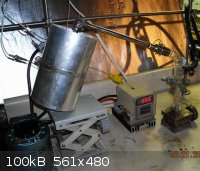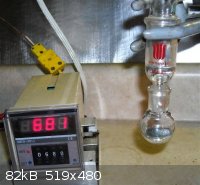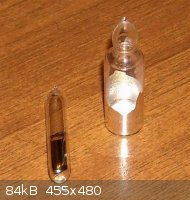Zan Divine
Hazard to Others
  
Posts: 170
Registered: 3-12-2011
Location: New York
Member Is Offline
Mood: Wishing all the worst that life has to offer to that SOB Wayne Lapierre
|
|
Rubidium from the chloride
First things first........
I want to thank Fleaker once again for his gift of RbCl, without which I wouldn't be writing this now.
This work was based on the method described by Donges in Handbook of Preparative Inorganic Chemistry Vol 1+2 by George Brauer (exerpt attached).
Reagents: RbCl (Johnson Matthey, 99% metals basis). This was ground, sieved & dried 2 hours @ 175 C. MW = 120.92
Ca (Better Equipped, roughly 2 mm dia. spheres). This was used as received. The spheres were a dull silver. MW = 40.08
A mixture of RbCl (25.0 g, 207 mmol) and Ca spheres (20.0 g, 499 mmol) was loaded into a chrome steel reactor of diameter 1.5 inches and length 5
inches. The bottom was previously welded shut and the top fitted with a welded pipe-thread adapter to fit the condenser tube. A K-type thermocouple
was clamped to the reactor via a worm-drive gear clamp. All pipe thread joints were lubricated by a MoSi2 paste used as a high-temp lubricant/sealant.
A picture of the apparatus is attached. The reactor is inserted into a resistance heater and padded by sand to give uniform heating. A vacuum (Note 1)
was applied (0.01 to 0.001 mm) and the mixture was heated 2 hours @ 150 C. The temperature was slowly increased over 4.5 hours to 650 C. No product
was observed yet. I decided to hold @ 650 C and after 10 - 15 minutes metal started distilling over. Over the next 1.5 hours, a total of 8.9 g (50%)
of Rb was collected (in two fractions) between 650 - 680 C (Notes 2 & 3).
Note 1. Estimated. I haven't cleaned out my McLeod guage yet.
Note 2. The initial Rb distillate froze very quickly. In contrast, Rb which distilled later in the reaction was liquid just above 25 C indicating
impurities.
Note 3. Yields are often characterized as quantitative in Li or Ca reductions of RbCl or CsCl. Whether it is a function of reagents (Ca spheres
instead of the Ca turnings), reactor geometry, mixing, technique or something else, my yields are typically 50 - 75 % and only once, with a very small
reaction, did yields even approach quantitative.
This is trial 1 in a series of reductions. Li will also be tried as a reductant.
For what it's worth, I think Rb will be more difficult than Cs to work with. It's in the same ballpark of reactivity but with the added drawback that
it is harder to move through syringe needles due to its mp.
Also, a little bit of O2 turns Cs golden but appears to turn Rb gray-blue.
Attachment: Pages from Rb & Cs from the chlorides + Ca.pdf (478kB)
This file has been downloaded 751 times  

[Edited on 23-6-2012 by Zan Divine]
He who makes a beast of himself gets rid of some of the pain of being a man. --HST
|
|
|
blogfast25
International Hazard
    
Posts: 10562
Registered: 3-2-2008
Location: Neverland
Member Is Offline
Mood: No Mood
|
|
Wunderbar!
Why the long preheat at 150 C?
[Edited on 22-6-2012 by blogfast25]
|
|
|
Zan Divine
Hazard to Others
  
Posts: 170
Registered: 3-12-2011
Location: New York
Member Is Offline
Mood: Wishing all the worst that life has to offer to that SOB Wayne Lapierre
|
|
That was something I saw in another reduction procedure. Probably does little really useful but I hoped it would scavenge any moisture adsorbed on
internal surfaces.
He who makes a beast of himself gets rid of some of the pain of being a man. --HST
|
|
|
woelen
Super Administrator
        
Posts: 8012
Registered: 20-8-2005
Location: Netherlands
Member Is Offline
Mood: interested
|
|
This is the real stuff! I explicitly leave out the word 'amateur', because this comes very close to what professional labs can reach. Most (virtually
all) of us keep things limited to glass and for me this is the reason why I cannot do any really high temperature chemistry.
|
|
|
blogfast25
International Hazard
    
Posts: 10562
Registered: 3-2-2008
Location: Neverland
Member Is Offline
Mood: No Mood
|
|
Zan:
The lower yield MUST be related to Ca's higher MP, no? Li still has the edge there, I think...
|
|
|
Zan Divine
Hazard to Others
  
Posts: 170
Registered: 3-12-2011
Location: New York
Member Is Offline
Mood: Wishing all the worst that life has to offer to that SOB Wayne Lapierre
|
|
Thanks for the kind words blogfast25 & woelen.
blogfast25,
Actually, my words weren't as clear as they should have been, the yield figures are about the same with either metal.
Now, I don't know much about this last reaction yet. Remember my mention of the fact that a cooled reactor which had stopped giving Cs suddenly came
roaring back to life after mashing the contents with a screwdriver blade and reheating?
Even though I listed several possible reasons for these lower-than-claimed yields, in my heart of hearts I believe it's a mixing issue. I'm hesitant
to claim that this is fact for the simple reason that I've not seen anybody else report a problem.
Having done the Li and Ca reactions, and having seen the less pure fractions that Ca can (also) produce, I see almost no reason to use Ca again.
Lithium reactions have given me product starting as low as 375 C. Ca didn't start until 650 C.
Makes me wonder if I throw some Li into this reactor (the Rb redn.) and re-heat, will I see more Rb? Does producing a LiCl/CaCl2 mixture perhaps allow
enough mp depression so that the reaction mixture may be a melt? These are just extemporaneous musings at this point.....
P.S. I don't need to wonder anymore. I opened the reactor under argon, added 2.5 g Li (360 mmol) and mashed everything together. Resealed and heated
in vacuo @ 650 - 675 C for 2 hours and got no additional Rb whatsoever. What in hell is going on here?
[Edited on 23-6-2012 by Zan Divine]
He who makes a beast of himself gets rid of some of the pain of being a man. --HST
|
|
|
Fleaker
International Hazard
    
Posts: 1252
Registered: 19-6-2005
Member Is Offline
Mood: nucleophilic
|
|
Great. Glad the material is getting used.
Rubidium is the harder element to prepare and the more expensive as it is less common.
I suspect it is a stirring/mixing issue--may have to go hotter. I presume you will re-distill all of the metals under high vacuum anyway? What
approximate mesh size are the granules?
Neither flask nor beaker.
"Kid, you don't even know just what you don't know. "
--The Dark Lord Sauron
|
|
|
Zan Divine
Hazard to Others
  
Posts: 170
Registered: 3-12-2011
Location: New York
Member Is Offline
Mood: Wishing all the worst that life has to offer to that SOB Wayne Lapierre
|
|
Trial 2, Reduction of RbCl with Li
Reagents: RbCl (Johnson Matthey, 99% metals basis). This was ground, sieved & dried 2 hours @ 175 C. MW = 120.92
Li (GalliumSource). This was extruded into 3/16" wire and cut into 1/4" lengths. MW = 6.94
A mixture of RbCl (30.0g, 248 mmol) and Li pieces (3.1g, 450 mmol) was loaded into a chrome steel reactor of diameter 1.5 inches and length 5 inches.
The bottom was previously welded shut and the top fitted with a welded pipe-thread adapter to fit the condenser tube. A K-type thermocouple was
clamped to the reactor via a worm-drive gear clamp. All pipe thread joints were lubricated by a MoSi2 paste used as a high-temp lubricant/sealant. A
picture of the apparatus is attached. The reactor is inserted into a resistance heater and padded by sand to give uniform heating. A vacuum was
applied (0.01 to 0.001 mm) and the mixture was heated 2 hours @ 150 C. The temperature was slowly increased over 4.0 hours to 515 C. Distillation of
Rb started at this temperature and continued until 630 C was reached, about 1 hour later. A total of 13.9 g (65.6%) of Rb was collected.
So far: advantage lithium
(and yes, I know I use AW and MW interchangeably sometimes, one fault among many...)
[Edited on 24-6-2012 by Zan Divine]
He who makes a beast of himself gets rid of some of the pain of being a man. --HST
|
|
|
Zan Divine
Hazard to Others
  
Posts: 170
Registered: 3-12-2011
Location: New York
Member Is Offline
Mood: Wishing all the worst that life has to offer to that SOB Wayne Lapierre
|
|
Quote: Originally posted by Fleaker  |
Rubidium is the harder element to prepare and the more expensive as it is less common.
I suspect it is a stirring/mixing issue--may have to go hotter. I presume you will re-distill all of the metals under high vacuum anyway? What
approximate mesh size are the granules? |
Hi Fleaker,
Glad you stopped by. Yes, I was a little surprised at first, but Rb is more difficult.
The Ca granules were ~2 mm diameter.
I think you identified the problem. It's insufficient mixing. I would bet that when I open the reactor, mash the contents together and re-heat, I'll
get a subsequent fraction. I'll know tomorrow.
I'm going to try to redistill these metals (Cs & Rb) from glass. Calculations suggest it may well be possible with my single stage pump.
[Edited on 24-6-2012 by Zan Divine]
He who makes a beast of himself gets rid of some of the pain of being a man. --HST
|
|
|
Fleaker
International Hazard
    
Posts: 1252
Registered: 19-6-2005
Member Is Offline
Mood: nucleophilic
|
|
If you want, I can send a diffusion pump and make it that much easier.
The 2 mm diameter globules are causing the problem!!
Probably need to ball mill it all in argon and then re-load the reactor. Sounds like fun. :-/
Up for any CsCl, I have a half kg to spare you.
Neither flask nor beaker.
"Kid, you don't even know just what you don't know. "
--The Dark Lord Sauron
|
|
|
Endimion17
International Hazard
    
Posts: 1468
Registered: 17-7-2011
Location: shores of a solar sea
Member Is Offline
Mood: speeding through time at the rate of 1 second per second
|
|
This is just awesome. Well done, Zan!
|
|
|
Zan Divine
Hazard to Others
  
Posts: 170
Registered: 3-12-2011
Location: New York
Member Is Offline
Mood: Wishing all the worst that life has to offer to that SOB Wayne Lapierre
|
|
Fleaker,
Anything you'd be willing to send my way would be immensly appreciated. It would be somewhat majestic to see something like that again. The
last time I used a diffusion pump was 1977!
Needless to say, the CsCl or any fraction thereof would be sublime. I'll U2U you.....
An update on the mass balance of the lithium reduction
Opening the reactor, mashing the contents and reheating @ 550 to 630 C for 1.5 hours gave no additional distillate. Both times the condenser tube was
removed for cleaning, however, resulted in sizeable booms when treated with the garden hose.
It appears that both times frozen Rb had remained in the metal tube. The problem was that if the tube is warmed much, it expands much more than the
glass. I broke the first vacuum take-off adapter I used. Fortunately, I had one in reserve.
The reactor was found to weigh 11.6 g more than it did empty. The combined weight of the residual Li plus LiCl was calculated to be 11.9 g. This
suggests that this reaction was ultimately quantitative although product isolation wasn't.
Attached is another file I find to be useful in working with molten metals.
BTW, Thanks, Endimion!
[Edited on 26-6-2012 by Zan Divine]
Attachment: Resistance to Liquid Metal Attack Chart.pdf (393kB)
This file has been downloaded 732 times
He who makes a beast of himself gets rid of some of the pain of being a man. --HST
|
|
|
Fleaker
International Hazard
    
Posts: 1252
Registered: 19-6-2005
Member Is Offline
Mood: nucleophilic
|
|
Awfully expensive salt to just wash away with the garden hose. Please consider careful neutralization and then boil down into a salt crust. I don't
know if excess LiCl would hurt, but there has to be an efficient way of recycling it.
Neither flask nor beaker.
"Kid, you don't even know just what you don't know. "
--The Dark Lord Sauron
|
|
|
vmelkon
National Hazard
   
Posts: 669
Registered: 25-11-2011
Location: Canada
Member Is Offline
Mood: autoerotic asphyxiation
|
|
A video so that we can watch would be nice.
|
|
|
Zan Divine
Hazard to Others
  
Posts: 170
Registered: 3-12-2011
Location: New York
Member Is Offline
Mood: Wishing all the worst that life has to offer to that SOB Wayne Lapierre
|
|
I'm not aware of a way to upload a video here (but there's a lot I've never really looked into). Is there one? If so, I'll do one if you want. I'm not
inclined to waste time screwing around with signing up to any other site just to put a video online since it adds very little information not conveyed
by a jpeg and words.
He who makes a beast of himself gets rid of some of the pain of being a man. --HST
|
|
|
blogfast25
International Hazard
    
Posts: 10562
Registered: 3-2-2008
Location: Neverland
Member Is Offline
Mood: No Mood
|
|
Video isn't really worth doing here, IMHO. The real action goes unseen anyway.
|
|
|
vmelkon
National Hazard
   
Posts: 669
Registered: 25-11-2011
Location: Canada
Member Is Offline
Mood: autoerotic asphyxiation
|
|
Quote: Originally posted by Zan Divine  | | I'm not aware of a way to upload a video here (but there's a lot I've never really looked into). Is there one? If so, I'll do one if you want. I'm not
inclined to waste time screwing around with signing up to any other site just to put a video online since it adds very little information not conveyed
by a jpeg and words. |
I upload videos to youtube. It is a more or less decent platform.
It would be nice to see a scan of the equipment (left to right) and see the rubidium dripping into the receiving flask. Also, the part where you add
it to the vial and seal it.
Think of it this way. You would be the only one putting up such a video on youtube.
|
|
|